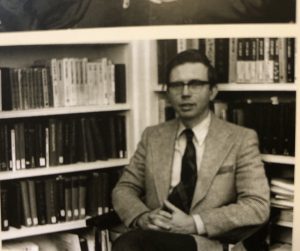
The Kenneth B. Pyle Prize for Best Article in JJS honors the founding editor of the Journal of Japanese Studies. The prize–accompanied by a $250 award–is given annually for a JJS research article published in the previous year.
For 2022, a selection committee has chosen “Life Through the Lens: Ozaki Kōyō and the Birth of the Photographic Imagination in Japanese Literature” by Pedro Bassoe as winner of the Pyle Prize. The committee commended this article “for its ground-breaking work that overturns received ideas about Kōyō. Bassoe’s close attention to how literary devices shaped Ozaki’s narrative-making with the camera, and conversely, how the camera attuned him to the value of describing nature in his novels, was illuminating.”
Honorable Mention for 2022 goes to Sachi Schmidt-Hori for “Yoshitsune and the Gendered Transformations of Japan’s Self Image.” The essay “links with great verve the transformation of Yoshitsune’s image with the cultural preoccupations of each era. Original, packed with information, and accessible to a wide range of readers, this essay is notable for both the depth of its research and the breadth of its analysis.”
Past winners:
2021: Jessamyn R. Abel; Grace En-Yi Ting, honorable mention
2020: Alice Y. Tseng; Seong Un Kim, honorable mention
Articles eligible for this prize are evaluated for their contribution to supporting the JJS mission of promoting the highest-quality scholarship through publication of empirical and interpretive work on Japan. Consideration is given to efforts to contextualize specialized research findings in ways that articulate their importance for the wider field of Japan studies.
Kenneth B. Pyle and his Japan studies colleagues at the University of Washington established JJS in 1974 through the generosity of the Japanese government’s million-dollar grant to the university. The UW faculty sought an innovative and enduring testament to the importance of this grant for the study of Japan around the world.

Ken served as Editor from 1974 to 1986 and subsequently in other positions with JJS, and he has been a regular contributor to JJS pages, most recently in 2020. Ken’s scholarship and teaching span more than 55 years, and his contributions to the study of Japan are profound.